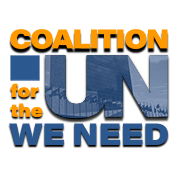The UN2020 Initiative began, in January 2017, with a Global Call to Action. The original and later versions of the call to action are provided below for reference and no further endorsements are being collected.
Endorsements of the Call to Action and other sign on products can be viewed here.
Global Call to Action: UN2020 – Building an agenda for a renewed United Nations
(as included in the program of the PyeongChang Global Peace Forum, that took place in PyeongChang, Korea, 9-11 Feb. 2019. )
The year 2020 will mark the 75th anniversary of the United Nations. This provides a much-needed opportunity for system-wide stocktaking, strengthening and renewal.
The pillars of the UN and of the Charter – Peace, Human Rights and Sustainable Development – must be strengthened. The UN2020 Initiative calls for government leaders and civil society to come together for an anniversary of progress and revitalization for the organization.
We are deeply concerned about a United Nations system that is under-resourced, under attack and unable to respond adequately to the many challenges facing humanity. These include:
- Increasing injustice and political violence
- Persistent poverty and growing inequality
- Threats to the sustainability of global ecosystems
There is an urgent need to develop the kind of UN system that is required to meet the challenges of this century, and to avoid repeating the catastrophic failures of the last century. A successful 75th anniversary summit on United Nations renewal, innovation and reform (combined with other multilateral processes and initiatives) can be a catalyst for these necessary improvements.
Notwithstanding current dangers and challenges, we believe the elements that can contribute to making significant progress are largely in place, and have enormous potential. Consider that a great many intergovernmental processes and negotiations will undertake “plus 5” anniversaries, assessments and institutional reviews at or near the time of an anticipated 2020 leaders’ summit. [i] The addition of an adequately prepared, forward-looking leaders’ summit can leverage synergies and complementarities among and between these major UN processes, and reinforce vitally needed political will for change.
The UN’s 50th anniversary in 1995 followed the end of the Cold War and, despite tremendous efforts to make the 50th a moment for reforming and strengthening the UN and Charter,<>[ii] very little was accomplished. However, in 2005 the 60th anniversary of the United Nations was the occasion for adoption of a significant package of reforms and innovations.[iii] In 2015, the 70th anniversary of the UN coincided with the historic adoption of the 2030 Agenda for Sustainable Development and the Paris Agreement on Climate Change.
The United Nations General Assembly has achieved a great deal through inclusive processes and well-prepared summits. Civil society organizations have been indispensable proponents and partners. 2020 should be a time when all UN stakeholders contribute to an honest stocktaking and renewal<>[iv], in order to strengthen the international legal and institutional order established under the Charter.
We therefore call for effective and inclusive preparatory processes for a UN2020 summit that will be a catalyst for the renewal and strengthening of the United Nations. We call for national, regional and global processes across all sectors, involving all stakeholders and relevant international organizations, leading to a renewed, innovative and reformed United Nations system that will be capable of addressing the global challenges of the 21st Century.
[i] A partial list would include: (1) the 5-year anniversary (in 2020) of adoption of the SDGs, as well as completion (in 2019) of the first four-year cycle of the High-Level Political Forum; (2) for the Paris Agreement on Climate Change, the annual stock-taking events leading to agreement in 2020 on renewed INDCs (Intended Nationally Determined Contributions); (3) the mandated 2020 review of the Human Rights Treaty Bodies; (4) the mandated 5-year review of the UN Peacebuilding Commission, dovetailing with the Secretary-General’s “Sustaining Peace” reforms; (5) the 20th anniversary of Security Council resolution 1325 and the Women, Peace and Security agenda; (6) the 25th anniversary of the Beijing, 1995 Fourth World Conference on Women (with modalities for a review to be determined in 2018); (7) the 2018 High level conference on nuclear disarmament, coupled with the 2020 review conference for the Treaty on the Non-Proliferation of Nuclear Weapons (NPT);
[ii] Examples:
“Toward a More Effective United Nations, Reorganization of the United Nations Secretariat: A Suggested Outline of Needed Reforms, Strengthening International Response to Humanitarian Emergencies,” Brian Urquhart and Erskine Childers, New York: the Ford Foundation, 1992.
A/47/277, “An Agenda for Peace: Preventive diplomacy, peacemaking and peacekeeping. Report of the Secretary-General pursuant to the statement adopted by the Summit Meeting of the Security Council on 31 January 1992.”
“Financing an Effective United Nations, Report of an Independent Advisory Group on UN Financing,” Shijuro Ogata and Paul Volcker, co-chairmen, New York: the Ford Foundation, 1993.
“Renewing the United Nations System,” Erskine Childers and Brian Urquhart, New York: the Ford Foundation, 1994.
“Our Global Neighborhood,” Commission on Global Governance, Ingvar Carlsson and Shridath Ramphal, co-chairmen, New York: Oxford University Press, 1995.
“The United Nations in Its Second Half Century: The Report of the Independent Working Group on the Future of the United Nations,” Moeen Qureshi and Richard von Weizsacker, co-chairmen, New York: Yale University/ the Ford Foundation, 1995.
[iii] A/60/L.1, 2005 World Summit Outcome Document.
[iv] While not presently advocating any specific measures, the UN2020 Initiative has identified some core principles and approaches for renewing the UN system. See “Elements of a progressive reform agenda for the United Nations.
Original version: Call to Action (September 2017)
